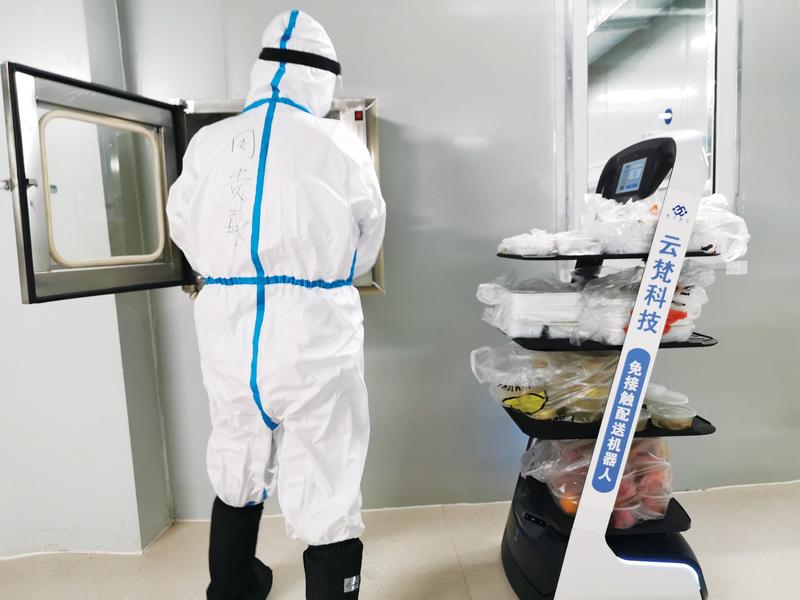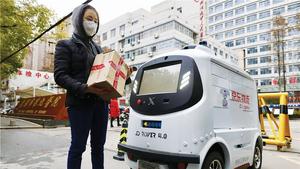 An artificial intelligence robot delivers food with a medical worker at a hospital in Guiyang, Guizhou province. (PHOTO PROVIDED TO CHINA DAILY)
An artificial intelligence robot delivers food with a medical worker at a hospital in Guiyang, Guizhou province. (PHOTO PROVIDED TO CHINA DAILY)
When the novel coronavirus began unleashing its wrath on the Chinese mainland some two months ago, Zhang Tao, founder of Shenzhen-based Pudu Technology, immediately decided to send dozens of its food-delivery robots to hospitals in the Hubei provincial capital, Wuhan — the epicenter of the outbreak — and other cities to join in the war on the pathogen.
To Zhang, the outbreak has proved the value and underlying demand of what he has been focusing on — food-delivery robots, or broadly, service robots.
An artificial intelligence robot plays a vital role in combating the coronavirus as it replaces the work of people at the front line, and thus reduces the risk of contagion
Zhou Jian, co-founder of UBTech
“In the beginning, many people didn’t understand why I ventured into such a segment, but this special incident explained its value and need,” said Zhang, a graduate of the Hong Kong University of Science and Technology.
Service robots came into the spotlight after the outbreak, which has claimed more than 4,600 lives and sickened over 124,500 worldwide, performing their role as “silent soldiers” fighting side by side with medical professionals.
With the advantage of enabling non-contact services, which are essential for avoiding human-to-human transmission, they’re being widely used in hospitals, checkpoints and communities, serving various functions ranging from guidance, disinfection, delivery, and checking and monitoring body temperatures.
The robot Pudu Technology provides can send food, medicine and daily necessities to patients’ rooms. When it receives a command, the machine plans the optimal route based on its positioning algorithm, and is capable of avoiding obstacles along the way.
So far, more than 130 robots from the company have been deployed in more than 60 mainland hospitals as well as Hong Kong’s Queen Elizabeth Hospital.
Other industry players are also playing their part.
 A woman picks up her delivery from an self-driving robot in Wuhan, Hubei province. (ZHU XINGXIN / CHINA DAILY)
A woman picks up her delivery from an self-driving robot in Wuhan, Hubei province. (ZHU XINGXIN / CHINA DAILY)
UBTech, another service robot-maker in Shenzhen, is contributing to the fight against the outbreak by offering robots that can check people’s identities and body temperatures.
An artificial intelligence robot plays a vital role in combating the coronavirus as it replaces the work of people at the front line, and thus reduces the risk of contagion, said UBTech Co-founder Zhou Jian.
He believes the robot will take on a bigger role in emergencies, public security and other fields in future.
According to the latest report by the Chinese Institute of Electronics, the global market for service robots reached US$9.46 billion last year. The size of the Chinese market for the sector, meanwhile, hit US$2.2 billion, accounting for about 23 percent of the world’s total.
However, the commercial application of such robots has been limited. According to market research firm Zhiyan Consulting, the penetration rate of commercial service robots on the mainland stood at roughly 3 percent last year, indicating there’s still plenty of room for growth.
“The outbreak is a big boost for the service-robots sector. Previous perception of service robots was that it wasn’t practical to use them in everyday life. But now, they’ve become an indispensable part,” said Xiao Fei, an industrial analyst with research firm Analysys.
The sector is expected to see significant growth in the near future with the government unveiling policies to support its development, and capital pouring in to fuel its growth, Xiao said. On the consumer side, the coronavirus outbreak has helped to cultivate the market, she added.
However, industry players still need time to upgrade their technologies so that service robots can deal with emergencies and complex scenarios effectively, Xiao said.


